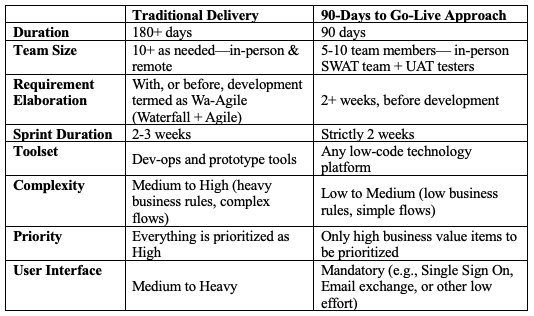Have You Heard of “Wa-Agile”?
Post-pandemic, there is a clear trend that technology projects are seeing the highest level of approvals. Everyone is looking to not only grow their technological footprints, but to also achieve it in less time and while on a budget. Agile projects are being planned and executed in every organization, which appears to be the best approach to move forward.
Organizations following a waterfall model for technology project deliveries have tried to go Wa-Agile (Waterfall + Agile); another popular term used for Wa-Agile is “Semi-Agile.” This is a step forward to achieve Agile maturity. In organizations where Agile is being used for delivering projects, they are commonly moving towards a 90-days to Go-live approach as opposed to the traditional long-term 180+days delivery approach.
How to Know if a 90-Days to Go-Live Approach is for You?
You might be a project sponsor who is looking for 90-days to Go-live or a technology consultant who is proposing 90-days to Go-live. Here are a few key characteristics to help know whether the 90-days to go-live is the next step for you, or your clients, after the agile delivery method:
- Committed stakeholders: Empowered stakeholder that act as Product Owners. They are engaged at all times and confident making decisions independently.
- High scrum maturity: Experience using scrum or another agile framework to deliver projects. They are comfortable with high-paced, short, two-weeks sprints.
- Well-defined requirements: They agree to a pre-determined project scope or a clear understanding of the scope and business problems.
- Desire for rapid development and deployment: You are using a low-code solution and its OOTB functionality, instead of pushing for a highly customized solution.
Key Benefits of 90-Days to Go-Live as a Client:
- Get to a minimum viable product quickly
- Keep a low budget for projects
- Low-risk delivery secures business buy-in
- Agile mindset drives business outcomes and allows for future change
- Set the expectations around 90-days to Go-live
- Optimization of project resources and supporting teams
Key Benefits of 90-Days to Go-Live as a Delivery Team:
- Increases energy within new & existing client accounts
- Leadership enablement: Experience end-to-end delivery which will improve their consulting skills
- Easy to staff model, but requires resources that have the right mindset, energy, and skills
- Increase ability to scale for largescale projects
Five Key Factors for a Successful 90-Days to Go-Live Approach:
- Resourcing: Small but strong teams help eliminate communication gaps and ensure better integration with clients. Resources should be 100% allocated to the project. There should be a right mix from developers, solution architects, business analyst, business architect, test team, UX/UI designers, product owners, and scrum masters. It’s important that this team stays together over multiple projects as this increase’s velocity for future projects.
- Schedule: Two-week sprints maintain velocity and ensure that the user story scope is small. The schedule is standard with every sprint, with minimal variation in every sprint. The reason being that consistency in the schedule creates predictability and helps drive progress at a consistent and accelerated pace. It also helps maintain quality.
- Weekly playbacks or showcase sessions: Weekly playback sessions conducted by business analysts or business architects with stakeholders will encourage early feedback. Feedback items should be included in the same sprint, however new requirements are additionally added to the backlog. Scrum masters need to make sure this doesn’t turn into a requirement gathering session. It helps in identifying challenges early on, tighten relationship and trust with stakeholders, create opportunities to innovate, keep the excitement and Agile spirit up, and create a culture of responsibility.
- In-Sprint Testing: It is important that the testing team is involved and are executing test cases in the sprint. This helps to achieve a production ready code by the end of every sprint. It has been observed that in the first couple of sprints, it is difficult to achieve 0 defects—however the goal of achieving it early is important.
- Low code platform solution: Using a low code platform solution can ensure the process doesn’t break when changes are made, building is much faster, encourages continuous playbacks, and allows for future client growth of apps.
Difference between 90-Days to Go-Live Approach vs Traditional Delivery:

Additional Notes (Please read with a grain of a salt):
- None of this will be possible without Product Owners.
- When everything is marked as high priority, a perfect product cannot be delivered in 90-days. However, high-value business problems could be solved with the 90-days to go-live approach.
- Do you need both business architects and solution architects? Yes, you do. Mixing key roles will lead to a solution which works for everyone from tech-heavy clients, to priority business clients.
- Business sponsors need to have an idea, as well as clarity on business problems that will need to be solved.
- Do not ignore recommendations from business architect and solution architect teams as they do this day in day out. Businesses are different, however key business solution outcomes are the same in every project—better, faster, and cost effective.
Recommendations to Read Next:

















